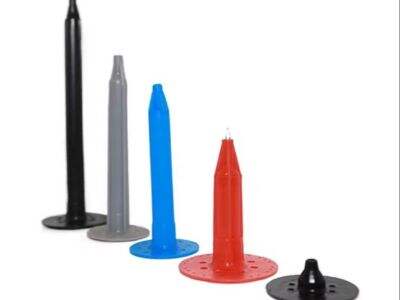If you have a project that requires an anchor fastener, there are several different kinds available to you. Anchor fasteners are special tools that help hold things together, especially when you are attaching something to a wall or another surface. :
Wedge Anchors:
Heavy-Duty fasteners, Wedge anchors used to Hold heavy things include big machines and buildings. They tighten when you turn a nut, so they grip tightly. In this method, they hold on grip on securing points where no things fall out. Wedge anchors are good for projects that require a high level of safety.
Sleeve Anchors: Sleeve anchors are a little different from wedge anchors. They also work with a nut that expands and grasps tightly. If you need to mount something lighter, such as attaching shelves to walls, sleeve anchors may suit your needs. They are great for DIY projects and will help you keep the shelving firm and tough.
Concrete Screws:
Concrete screws are designed specifically to be used in concrete. They also have a fine, tapered end, which allows them to penetrate the concrete easily. This is nice, since it means you can use them for adhesively attaching most anything you might want to concrete surfaces, even heavier features outdoors, such as fencing or furniture. This is a pair of concrete screws — just in case you have to be working with concrete, these are a good backup there.
Toggle Bolts: Toggle bolts can be used to attach objects to walls made of drywall or plaster. They’re unique in that they feature the spring-loaded toggle on the inside. You insert the bolt, and as you tighten it, the toggle then opens up on the back side of the wall with the anchor insulation fastener clamped tightly in place. This means you can hang items like pictures or shelves on your walls without worrying about them crashing to the ground.
Considerations in Selecting an Anchor Fastener
Having covered the various variants of anchor fasteners, it is time to discuss a few considerations you would want to keep in mind when selecting the right anchor fastener for your project. Read on for a few key takeaways to keep in mind:
Load capacity: One of the most essential things to note is the load capacity. This means that you must select a fastener that can bear the weight of whatever it is you’re connecting. To give you a concrete example, if you hang a heavy shelf you need a fastener that can safely hold that weight. Always consult the packaging for load capabilities for the fastener.
Material– Different materials need different kinds of fasteners. For example, if you want to attach something to a wall made of drywall, you will not want to use a concrete screw. Check the Material for the Exact FastenerYou Need Fasteners are the most important.
Environmental Considerations: Consider where the fastener will be used. Its intended environment sufficiently seeps into the fastening process. If it will be outdoors and subject to rain, snow, or extreme heat, be sure to select a fastener that can survive those weather conditions. Among the wires, some fasteners are coated to prevent rust and corrosion, making them essential for outdoor tasks.
How to Choose the Right Anchor Fastener for Your Project
Once you consider the above factors, it’s time to determine your anchor plastic fastened for your project. Here are some key things to keep in mind:
Wall Material: Be sure to select a fastener that is compatible with the material of the wall you are anchoring to. If you are working with concrete, for example, use a concrete screw. In cases where you are working with drywall, toggle bolts are a great option.
Screw Type: If your application calls for a screw-type fastener, it’s vital to ascertain that it’s the right size. Using the incorrect size can be hard to install and leads to a weak hold.
Length of the fastener: Above all, the length of the fastener is very important. The fastener must be long enough for the thickness of the material being attached. An overly short anchor won’t hold adequately and an excess of an expansion anchor plastic will certainly break indeed and damage the opposite side of the wall.
How To Choose The Right Anchor Fastener
There are so many different types of anchor fasteners out there to choose from, it can be hard to figure out exactly which one is the best for your particular material. Here are some tips that can help guide your decision:
Concrete — Wedge anchors or sleeve anchors are typically best for concrete projects. They have excellent grip and are designed to be used for working with concrete or similar material.
Drywall: Use toggle bolts if you’re hanging on drywall. They have a special design that securely holds items and won't damage the wall.
Wood: If you are working with wood, nothing beats a wood screw or lag bolt. These fasteners are designed to draw the timber together tightly to keep everything locked together tightly.
Soaring Things with the Right Anchor fastener
Another step to ensure safety and stability is using the correct anchor fastener. To assist you, here are some reminders:
Do Not Use Fasteners That Are Too Big: Always ensure the size of fastener is the same as the size of object that are trying to attach. The right-sized fastener will keep everything tight.
Read the Instructions: Make sure to read and follow the instructions provided by the manufacturer when installing the anchor fastener. Also, it will help you to do the job correctly and safely.
Double Check: Before attaching anything, double check that the fastener is tightly secured and able to carry the weight of the item. This last check can be the difference between an accident and everything that happens after that, or safety.
 EN
EN
 AR
AR
 BG
BG
 HR
HR
 CS
CS
 DA
DA
 NL
NL
 FI
FI
 FR
FR
 DE
DE
 EL
EL
 HI
HI
 IT
IT
 JA
JA
 KO
KO
 NO
NO
 PL
PL
 PT
PT
 RO
RO
 RU
RU
 ES
ES
 SV
SV
 TL
TL
 IW
IW
 ID
ID
 SR
SR
 UK
UK
 VI
VI
 HU
HU
 TH
TH
 TR
TR
 FA
FA
 MS
MS
 GA
GA
 IS
IS
 LA
LA
 MN
MN
 NE
NE
 KK
KK
 UZ
UZ



